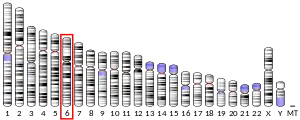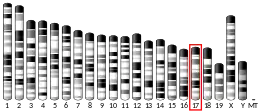HLA-DOB
HLA class II histocompatibility antigen, DO beta chain is a protein that in humans is encoded by the HLA-DOB gene.[5]
HLA-DOB belongs to the HLA class II beta chain paralogues. This class II molecule is a heterodimer consisting of an alpha (DOA) and a beta chain (DOB), both anchored in the membrane. It is located in intracellular vesicles. DO suppresses peptide loading of MHC class II molecules by inhibiting HLA-DM. Class II molecules are expressed in antigen presenting cells (APC: B lymphocytes, dendritic cells, macrophages). The beta chain is approximately 26-28 kDa and its gene contains 6 exons. Exon one encodes the leader peptide, exons 2 and 3 encode the two extracellular domains, exon 4 encodes the transmembrane domain and exon 5 encodes the cytoplasmic tail.[5]
References
- ENSG00000241910, ENSG00000243612, ENSG00000239457, ENSG00000241386, ENSG00000241106 GRCh38: Ensembl release 89: ENSG00000243496, ENSG00000241910, ENSG00000243612, ENSG00000239457, ENSG00000241386, ENSG00000241106 - Ensembl, May 2017
- GRCm38: Ensembl release 89: ENSMUSG00000041538 - Ensembl, May 2017
- "Human PubMed Reference:". National Center for Biotechnology Information, U.S. National Library of Medicine.
- "Mouse PubMed Reference:". National Center for Biotechnology Information, U.S. National Library of Medicine.
- "Entrez Gene: HLA-DOB major histocompatibility complex, class II, DO beta".
Further reading
- Beck S, Kelly A, Radley E, et al. (1992). "DNA sequence analysis of 66 kb of the human MHC class II region encoding a cluster of genes for antigen processing". J. Mol. Biol. 228 (2): 433–41. doi:10.1016/0022-2836(92)90832-5. PMID 1453454.
- Piatier-Tonneau D, Gastinel LN, Amblard F, et al. (1991). "Interaction of CD4 with HLA class II antigens and HIV gp120". Immunogenetics. 34 (2): 121–8. doi:10.1007/BF00211424. PMID 1869305. S2CID 10116507.
- Rosenstein Y, Burakoff SJ, Herrmann SH (1990). "HIV-gp120 can block CD4-class II MHC-mediated adhesion". J. Immunol. 144 (2): 526–31. PMID 1967269.
- Bowman MR, MacFerrin KD, Schreiber SL, Burakoff SJ (1991). "Identification and structural analysis of residues in the V1 region of CD4 involved in interaction with human immunodeficiency virus envelope glycoprotein gp120 and class II major histocompatibility complex molecules". Proc. Natl. Acad. Sci. U.S.A. 87 (22): 9052–6. doi:10.1073/pnas.87.22.9052. PMC 55099. PMID 1978941.
- Jonsson AK, Rask L (1989). "Human class II DNA and DOB genes display low sequence variability". Immunogenetics. 29 (6): 411–3. doi:10.1007/BF00375872. PMID 2499532. S2CID 5481750.
- Clayton LK, Sieh M, Pious DA, Reinherz EL (1989). "Identification of human CD4 residues affecting class II MHC versus HIV-1 gp120 binding". Nature. 339 (6225): 548–51. Bibcode:1989Natur.339..548C. doi:10.1038/339548a0. PMID 2543930. S2CID 4246781.
- Diamond DC, Sleckman BP, Gregory T, et al. (1988). "Inhibition of CD4+ T cell function by the HIV envelope protein, gp120". J. Immunol. 141 (11): 3715–7. PMID 2846691.
- Tonnelle C, DeMars R, Long EO (1986). "DO beta: a new beta chain gene in HLA-D with a distinct regulation of expression". EMBO J. 4 (11): 2839–47. doi:10.1002/j.1460-2075.1985.tb04012.x. PMC 554587. PMID 2998758.
- Servenius B, Rask L, Peterson PA (1987). "Class II genes of the human major histocompatibility complex. The DO beta gene is a divergent member of the class II beta gene family". J. Biol. Chem. 262 (18): 8759–66. PMID 3036827.
- Andrieu JM, Even P, Venet A (1986). "AIDS and related syndromes as a viral-induced autoimmune disease of the immune system: an anti-MHC II disorder. Therapeutic implications". AIDS Research. 2 (3): 163–74. doi:10.1089/aid.1.1986.2.163. PMID 3489470.
- Houlgatte R, Scarmato P, el Marhomy S, et al. (1994). "HLA class II antigens and the HIV envelope glycoprotein gp120 bind to the same face of CD4". J. Immunol. 152 (9): 4475–88. PMID 7512597.
- Chirmule N, McCloskey TW, Hu R, et al. (1995). "HIV gp120 inhibits T cell activation by interfering with expression of costimulatory molecules CD40 ligand and CD80 (B71)". J. Immunol. 155 (2): 917–24. PMID 7541827.
- Rowell JF, Stanhope PE, Siliciano RF (1995). "Endocytosis of endogenously synthesized HIV-1 envelope protein. Mechanism and role in processing for association with class II MHC". J. Immunol. 155 (1): 473–88. PMID 7602119.
- Chen YH, Böck G, Vornhagen R, et al. (1994). "HIV-1 gp41 binding proteins and antibodies to gp41 could inhibit enhancement of human Raji cell MHC class I and II expression by gp41". Mol. Immunol. 31 (13): 977–82. doi:10.1016/0161-5890(94)90092-2. PMID 8084338.
- Chirmule N, Wang XP, Hu R, et al. (1994). "Envelope glycoproteins of HIV-1 interfere with T-cell-dependent B cell differentiation: role of CD4-MHC class II interaction in the effector phase of T cell help". Cell. Immunol. 155 (1): 169–82. doi:10.1006/cimm.1994.1110. PMID 8168144.
- Callahan KM, Rowell JF, Soloski MJ, et al. (1993). "HIV-1 envelope protein is expressed on the surface of infected cells before its processing and presentation to class II-restricted T lymphocytes". J. Immunol. 151 (6): 2928–42. PMID 8376762.
- Glynne R, Kerr LA, Mockridge I, et al. (1993). "The major histocompatibility complex-encoded proteasome component LMP7: alternative first exons and post-translational processing". Eur. J. Immunol. 23 (4): 860–6. doi:10.1002/eji.1830230414. PMID 8458375.
- Beck S, Abdulla S, Alderton RP, et al. (1996). "Evolutionary dynamics of non-coding sequences within the class II region of the human MHC". J. Mol. Biol. 255 (1): 1–13. doi:10.1006/jmbi.1996.0001. PMID 8568858.
- Liljedahl M, Kuwana T, Fung-Leung WP, et al. (1996). "HLA-DO is a lysosomal resident which requires association with HLA-DM for efficient intracellular transport". EMBO J. 15 (18): 4817–24. doi:10.1002/j.1460-2075.1996.tb00862.x. PMC 452218. PMID 8890155.
- Ruff AL, Guarnieri FG, Staveley-O'Carroll K, et al. (1997). "The enhanced immune response to the HIV gp160/LAMP chimeric gene product targeted to the lysosome membrane protein trafficking pathway". J. Biol. Chem. 272 (13): 8671–8. doi:10.1074/jbc.272.13.8671. PMID 9079699.





